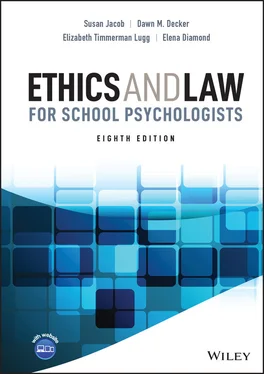Susan Jacob - Ethics and Law for School Psychologists
Здесь есть возможность читать онлайн «Susan Jacob - Ethics and Law for School Psychologists» — ознакомительный отрывок электронной книги совершенно бесплатно, а после прочтения отрывка купить полную версию. В некоторых случаях можно слушать аудио, скачать через торрент в формате fb2 и присутствует краткое содержание. Жанр: unrecognised, на английском языке. Описание произведения, (предисловие) а так же отзывы посетителей доступны на портале библиотеки ЛибКат.
- Название:Ethics and Law for School Psychologists
- Автор:
- Жанр:
- Год:неизвестен
- ISBN:нет данных
- Рейтинг книги:3 / 5. Голосов: 1
-
Избранное:Добавить в избранное
- Отзывы:
-
Ваша оценка:
- 60
- 1
- 2
- 3
- 4
- 5
Ethics and Law for School Psychologists: краткое содержание, описание и аннотация
Предлагаем к чтению аннотацию, описание, краткое содержание или предисловие (зависит от того, что написал сам автор книги «Ethics and Law for School Psychologists»). Если вы не нашли необходимую информацию о книге — напишите в комментариях, мы постараемся отыскать её.
Ethics and Law for School Psychologists
Ethics and Law for School Psychologists
Ethics and Law for School Psychologists — читать онлайн ознакомительный отрывок
Ниже представлен текст книги, разбитый по страницам. Система сохранения места последней прочитанной страницы, позволяет с удобством читать онлайн бесплатно книгу «Ethics and Law for School Psychologists», без необходимости каждый раз заново искать на чём Вы остановились. Поставьте закладку, и сможете в любой момент перейти на страницу, на которой закончили чтение.
Интервал:
Закладка:
Federal Antidiscrimination Legislation
Congress also has passed antidiscrimination or civil rights legislation that has had an impact on public school policies and practices. These statutes prohibit state and school authorities from discriminating against individuals on the basis of race, color, or national origin 3; sex; 4or disability 5in any program or activity receiving any federal funding. A state department of education (SDE) may choose not to pursue monies available under federal grant statutes (e.g., funds for infants and toddlers with disabilities). School districts must comply with antidiscrimination legislation if they receive any federal funds for any purpose, however.
Federal antidiscrimination laws also protect students from harassment based on race, color, national origin, sex, or disability. The term harassment means oral, written, graphic, or physical conduct relating to an individual’s race, color, national origin, sex, or disability that is sufficiently severe, pervasive, or persistent so as to interfere with or limit the ability of an individual to participate in or benefit from the district’s programs or activities (see U.S. Department of Education & Bias Crimes Task Force of the National Association of Attorneys General, 1999). Sexual harassment means unwanted and unwelcome sexual advances that are sufficiently severe, pervasive, or persistent so as to interfere with or limit the ability of an individual to participate in or benefit from the district’s programs or activities. The federal laws cited make schools responsible for taking reasonable steps to remedy harassment.
The U.S. DOE Office for Civil Rights (OCR) provides guidance regarding the interpretation and implementation of antidiscrimination law in the schools and conducts investigations of schools after receiving a discrimination complaint. If evidence of discrimination is found, the OCR may order a school district to engage in remedial actions to correct the discrimination. If voluntary compliance cannot be achieved through informal actions, the OCR may take steps to suspend federal funding to the school.
Federal statutory law does not explicitly prohibit discrimination in the public schools based on religion or sexual orientation, gender identity, or gender expression. However, in 2010, the OCR extended its protections to include discrimination and harassment based on a student’s religion. In addition, the OCR made known that, as part of national efforts to reduce bullying in schools and to ensure equal educational opportunity for all students, it explicitly interpreted Title IX as prohibiting harassment and bullying based on sexual orientation or nonconformity to gender role stereotypes. Furthermore, if harassment based on sexual orientation or nonconformity to gender-role stereotypes resulted in a hostile learning environment for a student, schools “have an obligation to take immediate and effective action to eliminate the hostile environment” (Ali, 2010, p. 8).
In 2016, the U.S. Department of Justice and DOE restated their Title IX obligations to LGBTQ+ 6and clarified that schools should treat transgender students consistent with their gender identity (Lhamon & Gupta, 2016, May 13). The 2016 document was rescinded during the Trump administration. Guidance issued in 2017 stated that transgender students will continue to have protections from discrimination and harassment, but that they will no longer have a right under Title IX to access to public facilities (e.g., restrooms and locker rooms) based on their gender identity rather than their assigned sex at birth (Battle & Wheeler, 2017). In 2021, citing the Bostock v. Clayton County (2020) Supreme Court decision, U.S. DOE OCR issued an updated interpretation of Title IX, reaffirming that the law applies to discrimination based on gender identity as well as sexual orientation, with exceptions for schools controlled by religious organizations where compliance would not be consistent with religious tenets (Goldberg, 2021, June 16). As of June 2021, the issues of whether transgender students must be allowed to access public facilities or play school sports based on their gender identity rather than their sex assigned at birth had not been explicitly considered by the U.S. Supreme Court or DOE. (See Chapter 9.)
Rehabilitation Act of 1973
Section 504 of the Rehabilitation Act of 1973 (Pub. L. No. 93–112) specifically prohibits discrimination against any otherwise qualified individual solely on the basis of a handicapping condition in any program or activity receiving federal financial assistance. Section 504 is discussed in Chapter 5.
Americans with Disabilities Act of 1990
The Americans with Disabilities Act of 1990 ([ADA], Pub. L. No. 101–336) is considered to be the most significant federal law ensuring the civil rights of all individuals with disabilities. It was amended by the Americans with Disabilities Act Amendments of 2008 (Pub. L. No. 110–325). The ADA guarantees equal opportunity in employment, public accommodation, transportation, state and local government services, and telecommunications to individuals with disabilities. Title II, Subtitle A, is the portion of the law most pertinent to public schools (see Chapter 5).
Civil Rights Act of 1871
School personnel also should be familiar with Section 1983 of the Civil Rights Act of 1871. This statute was passed following the Civil War as a reaction to the mistreatment of Blacks, and it originally was known as the “Ku Klux Klan Act” Under Section 1983, any person whose constitutional rights (or rights under federal law) have been violated by a government (school) official may sue for damages in federal court, and the official may be held liable for damages (see the section “Lawsuits Against Schools and School Psychologists,” later in this chapter).
Rules and Regulations
When federal legislation is enacted, an executive agency is charged with the responsibility for developing rules and regulations implementing the law. For example, rules and regulations implementing IDEA and FERPA are issued by the U.S. DOE. For all intents and purposes, rules and regulations have the same impact as actual legislation . School psychologists need to be familiar with both the statute itself and the regulations implementing the law. Federal statutes are compiled and published in the United States Code (U.S.C.). Rules and regulations implementing a law first appear in a daily publication called the Federal Register (FR) and subsequently are published in the Code of Federal Regulations (CFR). The Code of Federal Regulations has 50 titles, and each volume is updated once each calendar year. The Electronic Code of Federal Regulations (e-CFR) can be accessed on the Internet at www.govinfo.gov. The e-CFR is updated daily, but it is not considered to be the “official” legal edition of federal regulations. The U.S. DOE Web site also has links to statutes and regulations pertinent to education ( http://www.ed.gov). Citations for important federal statutes are provided in Appendix D at the back of this book.
State Education Laws
As Hubsch (1989) noted, the majority of public school statutory law is enacted at the state level. School psychologists must become familiar with the laws pertinent to the delivery of school psychological services in the state where they are employed, in addition to federal statutes and regulations. State laws affecting education typically can be found at a state’s department of education website.
CASE LAW
A third source of law is case law. Case law, or common law, is law that emerges from court decisions (Russo, 2018). The common law system can be traced back to medieval England. At that time, it was widely accepted that there were “laws of nature” to guide solutions to problems if those laws could be discovered. Legal scholars studied past court decisions for the purpose of discovering those “natural laws.” The rules and principles that judges customarily followed in making decisions were identified and, at times, articulated in case decisions, and judges tended to base new decisions on those earlier legal precedents. Common law is thus discovered law rather than enacted law (Russo, 2018, p. 1). Many aspects of public school law today are based on common law rather than enacted law, as Russo pointed out. For example, the courts generally have upheld a teacher’s right to use corporal punishment to discipline students where no state laws or school board policies prohibit its use. Acceptance of the use of corporal punishment in the schools by courts has a long history in case law (see Chapter 9).
Читать дальшеИнтервал:
Закладка:
Похожие книги на «Ethics and Law for School Psychologists»
Представляем Вашему вниманию похожие книги на «Ethics and Law for School Psychologists» списком для выбора. Мы отобрали схожую по названию и смыслу литературу в надежде предоставить читателям больше вариантов отыскать новые, интересные, ещё непрочитанные произведения.
Обсуждение, отзывы о книге «Ethics and Law for School Psychologists» и просто собственные мнения читателей. Оставьте ваши комментарии, напишите, что Вы думаете о произведении, его смысле или главных героях. Укажите что конкретно понравилось, а что нет, и почему Вы так считаете.












